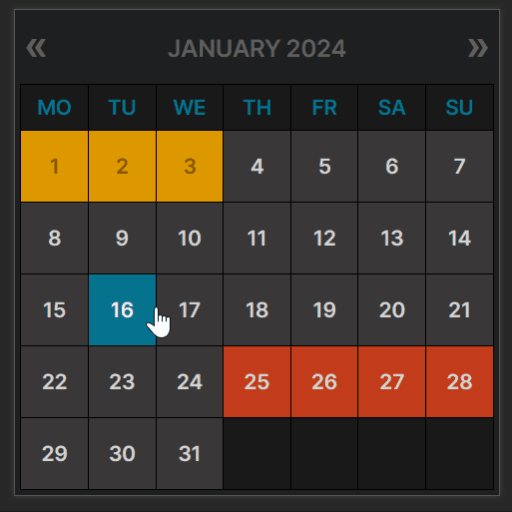
前言介紹
- 這款 WordPress 外掛「RS EVENT multiday」是 2009-04-20 上架。
- 目前有 100 個安裝啟用數。
- 上一次更新是 2014-10-10,距離現在已有 3858 天。超過一年沒更新,安裝要確認版本是否可用。以及後續維護問題!
- 外掛最低要求 WordPress 2.8 以上版本才可以安裝。
- 有 5 人給過評分。
- 還沒有人在論壇上發問,可能目前使用數不多,還沒有什麼大問題。
外掛協作開發者
wp-lefty |
外掛標籤
events | widget | event widget | Manage events |
內容簡介
"RS EVENT multiday" 是一個易於使用且高度靈活的工具,可通過添加側邊欄小工具 "RS EVENT multiday " 和/或功能 rs_event_list()、rs_event_post() 和 rs_event_id() 來管理和列印文章作為活動。它基於 Robert Sargant 的原始 "RS EVENT"。
此外,該外掛程式還提供了在您的部落格側邊欄中增加 "RS EVENT multiday" 小工具的可能性。它可以讓您顯示即將到來和/或過去的活動列表。
"RS EVENT multiday" 包含三個不同的功能,可在模板中使用:rs_event_list()、rs_event_post() 和 rs_event_id()。
功能:
首先,"RS EVENT multiday" 小工具將功能 rs_event_list() 添加到您的側邊欄,您可以透過部落格後端的小工具控制面板自訂所有設置。如果您想要創建特定的頁面來顯示活動列表,您應該為您使用的主題創建一個專門的模板文件,並手動將功能 rs_event_list() 添加到您模板的代碼中。
rs_event_list()
這是用於小工具的功能。當然,它也可以在模板中使用。
它根據其給予的參數打印出一個活動的無序列表(見下文)。
Ul 以及 li 都包括 class="rsevent",因此您可以使用樣式表自訂輸出。
此外,輸出可以用參數 "html_list_v1"、"html_list_v2"、"html_list_v3" 和 "html_list_v4" 進行自訂。
有關詳細信息,請參閱下面的參數部分。
注意:如果您只想獲取從 rs_event_list() 返回的值,以使它們不被打印,則應使用功能 rs_event_list_return()。
rs_event_post()
此功能應在單個文章模板中使用(通常是您的主題文件 single.php)
它會印出活動日期。
可以使用參數 html_post_v1、html_post_v2、html_post_v3 和 html_post_v4 自訂輸出。
有關詳細信息,請參閱下面的參數部分。
注意:如果您只想從 rs_event_post() 獲取返回值,以使它們不被打印,則應使用功能 rs_event_post_return()。(對於例如 Thematic 主題非常有用。)
rs_event_id()
此功能將返回一個包含帶有事件數據的文章 ID 的數組。 然後可以在其他功能或循環中使用這些 ID 。
每個功能都可以透過參數進行自定義。
參數:
參數用於自定義在模板中使用的功能(如上所述)。如果您使用 "RS EVENT multiday" 的側邊欄小工具,您可以透過部落格後端的小工具控制面板進行所有設置。
請參閱下面的示例("如何將參數傳遞給其中一個功能")以查看它的工作原理。
title
(string) 您側邊欄中的小工具標題。 在模板中添加功能時,不使用此項。
默認值:'Upcoming Events'
timespan
(integer) 取得活動將來的最大天數。
默認值:365
history
(integer) 取得活動過去的最大天數。這也可以設置為負數,例如-2,以防止在接下來的兩天內發生的事件出現。
默認值:0
原文外掛簡介
“RS EVENT multiday” is an easy to use and highly flexible tool to manage and print posts as events by adding the sidebar-widget “RS EVENT multiday” and/or the functions rs_event_list(), rs_event_post() and rs_event_id(), which can be used in templates. It is based on the original “RS EVENT” by Robert Sargant.
The plugin offers the possibility to add a “RS EVENT multiday” widget to the sidebar of your blog.
It allows you to show a list of upcoming and/or past events.
“RS EVENT multiday” includes three different functions, which can be used in templates.
rs_event_list(), rs_event_post(), rs_event_id()
FUNCTIONS
First of all, the “RS EVENT multiday” widget adds the function rs_event_list() to your sidebar and you can costumize all the settings via the widget control panel at the backend of your blog. If you want to create designated pages to show an event list, you should create a special template file for the theme you use and add the function rs_event_list() manually to the code of your template.
rs_event_list()
This is the function used for the widget. Of course, it can be used in templates as well.
It prints an unordered list of events according to the parameters given to it (see below).
Both, the
- and the
- include class=”rsevent”, so you can costumize the output with stylesheets.
Furthermore, the output can be customized with the parameters “html_list_v1”, “html_list_v2”, “html_list_v3” and “html_list_v4”.
For details see the parameters-section below.
Note: If you just want to get the return values from rs_event_list(), so they do not get printed, you should use the function rs_event_list_return().rs_event_post()
This function should be used in the single-post-template (usually the file single.php of your theme).
It prints the date of the event.
The output can be customized with the parameters “html_post_v1”, “html_post_v2”, “html_post_v3” and “html_post_v4”.
For details see the parameters-section below.
Note: If you just want to get the return values from rs_event_post(), so they do not get printed, you should use the function rs_event_post_return(). (This might be useful for e.g. Thematic themes.)rs_event_id()
This function returns an array with IDs of posts, which include event-data. This array of IDs can then be used in other functions or loops.Each function can be customized by parameters.
PARAMETERS
The parameters are used to customize the functions (see above), if you use them within templates. If you use the sidebar-widget of “RS EVENT multiday”, you can make all the settings via the widget control panel at the backend of your blog.
Please, have a look at the example below (“How to pass on parameters to one of the functions”) in order to see how it works.
title
(string) The widget-title in your sidebar. Not used, when the function is added to a template.
default value: ‘Upcoming Events’
timespan
(integer) The maximum distance into the future events will be retrieved for, in days.
default value: 365
history
(integer) The maximum distance into the past that events will be retrieved for, in days. This can also be set to a negative negative number, e.g. -2 to prevent events that are occuring in the next two days from appearing.
default value: 0
date_format_1
(string) The style in which the date is formatted. date_format_1 is used for single-day events, for the end date of multi-day events, and for the start date of multi-day events if the two dates are NOT within the same year.
default value: ‘d.m.Y’
date_format_2
(string) The style in which the date is formatted. date_format_2 is used for the start date of multi-day events if the two dates are within the same year.
default value: ‘d.m.’
groupdateformat_y
(string) The style in which the yearly headline date is formatted, if events are grouped by year. See also parameter group_by_year.
default value: ‘Y’
groupdateformat_m
(string) The style in which the monthly headline date is formatted, if events are grouped by month. See also parameter group_by_month.
default value: ‘F’
groupdateformat_d
(string) The style in which the daily headline date is formatted, if events are grouped by day. See also parameter group_by_day.
default value: ‘d, l’
time_format
(string) The style in which the time is formatted.
Note: ‘second’ cannot be entered for event time and must not be used because of variable $fake_second (used to mark empty time value.)
default value: ‘H:i’
time_connector
(string) The sign(s) that are printed between the start-time and the end-time, if an end-time is entered.
default value: ‘ – ‘
html_list_v1
(string) Used for rs_event_list(). Formats the output, if first date and time of an event is entered with “multi-day”-option off.
default value:
‘ %DATE% @ %TIME% | %LOCATION%
%TITLE%
» read more «
‘
html_list_v2
(string) Used for rs_event_list(). Formats the output, if first date but no time is entered with “multi-day”-option off; if %TIME% is used here anyway (which usually does not make any sense), output of %TIME% equals “–:–“.
default value:
‘ %DATE% | %LOCATION%
%TITLE%
» read more «
‘
html_list_v3
(string) Used for rs_event_list(). Formats the output, if “multi-day”-option is on and first date and end date is entered.
default value:
‘ %DATE% - %ENDDATE% | %LOCATION%
%TITLE%
» read more «
‘
html_list_v4
(string) Used for rs_event_list(). Formats the output, if “multi-day”-option is on but no end date is entered.
default value:
‘ %DATE% (multi-day) | %LOCATION%
%TITLE%
» read more «
‘
html_post_v1
(string) Used for rs_event_post(). Formats the output, if first date and time of an event is entered with “multi-day”-option off.
default value:
‘%DATE% @ %TIME%‘
html_post_v2
(string) Used for rs_event_post(). Formats the output, if first date but no time is entered with “multi-day”-option off; if %TIME% is used here anyway
(which usually does not make any sense), output of %TIME% equals “–:–“.
default value:
‘%DATE%‘
html_post_v3
(string) Used for rs_event_post(). Formats the output, if “multi-day”-option is on and first date and end date is entered.
default value:
‘%DATE% - %ENDDATE%‘
html_post_v4
(string) Used for rs_event_post(). Formats the output, if “multi-day”-option is on but no end date is entered.
default value:
‘%DATE% (multi-day event)‘
max_events
(integer) The maximum number of events to show. If this is set to 0, then all events will be shown.
default value: 0 (i.e. show all)
group_by_year
(integer) value 0 = off, value 1 = on. If group_by_year is set, the function rs_event_list() outputs a date as a headline for all events, that take place within the same year. For multiday events, the first day of the event is used for grouping and every event shows up only once. The format of the date can be set with the parameter groupdateformat_y
default value: 0 (i.e. “off”)
group_by_month
(integer) value 0 = off, value 1 = on. If group_by_month is set, the function rs_event_list() outputs a date as a headline for all events, that take place within the same month. For multiday events, the first day of the event is used for grouping and every event shows up only once. The format of the date can be set with the parameter groupdateformat_m
default value: 0 (i.e. “off”)
group_by_day
(integer) value 0 = off, value 1 = on. If group_by_day is set, the function rs_event_list() outputs a date as a headline for all events, that take place within the same day. For multiday events, the first day of the event is used for grouping and every event shows up only once. The format of the date can be set with the parameter groupdateformat_y
default value: 0 (i.e. “off”)
no_events_msg
(string) The output when the are no events within the set timespan.
default value: ‘no upcoming events’
sort_order
(string) Whether to list the events in ascending (value: ‘ASC’) or descending (value: ‘DESC’) date order.
default value: ‘ASC’
category
(integer) Show only events listed against posts in the category with this ID number. If this is set to 0, then all events will be shown.
default value: 0 (i.e. show all)
fulltext_active
(integer) If this is set to 0, the wildcard %FULLTEXT% cannot be used for the HTML-Output of the Event-List and an excerpt for the wildcard %EXCERPT% is not created automatically, consequently, it has to be entered via the excerpt-box at the edit-post-page. You should disable %FULLTEXT% and set this to 0, if you do not need or use %FULLTEXT% and if you manually creat excerpts in order to improve the perfomance of the plugin RS EVENT multiday.
default value: 1 (i.e. enabled and %FULLTEXT% can be used and excerpts are created automatically)
loggedin
(integer) Allows to hide the widget or the output of the function rs_event_list(). If this is set to 0, the list or the widget will only be visible to logged in users.
default value: 0 (i.e. widget and function are visible to all)
Customizing the html-output with wildcards
The values “html_list_vX” and “html_post_vX” can be styled both for the widget (-> via the widget control panel) and within templates (please have a look at the example “How to pass on parameters to one of the functions” below).
Simply use html-code and the following parameters:
%URL%
Outputs the URL of the event-post.
%DATE%
Outputs the start-date of the event, formatted as date_format_1 in _v1, _v2 and _v4 and as date_format_2 in _v3.
%ENDDATE%
Outputs the end-date of the event, formatted as date_format_2.
%TIME%
If a starttime and endtime is entered, the output is similar to %STARTTIME% time-connector %ENDTIME%.
If just a starttime and no endtime is entered, %TIME% is similar to %STARTTIME%.
%STARTTIME%
Outputs the time when the event starts, if one is entered, formatted as time_format.
%ENDTIME%
Outputs the time when the event ends, if one is entered (can only be entered if a starttime exists), formatted as time_format.
%LOCATION%
Outputs an ordinary text value (if one is entered) which might be used to enter e.g. the location of the event.
%TITLE%
Outputs the title of the post.
%FULLTEXT%
Outputs the entire text of the post. (You can disable this wildcard to improve the perfomance of the plugin.)
%EXCERPT%
Outputs the excerpt of the post. If the %FULLTEXT% wildcard is disabled, an excerpt is not created automatically.
Consequently, the excerpt-box at the edit-post-page has to be filled with text in order to output an excerpt when %FULLTEXT% is disabled.
Please, also see the information for “fulltext_active” at the parameter section above.
%ID%
Outputs the ID of the post.
How to pass on parameters to one of the functions
Here is an example how to pass on some parameters to the function rs_event_list() [or rs_event_list_return()], when used within a template.
It works similar with rs_event_post() [and rs_event_post_return()], just use the html_post_vX parameters instead of the html_list_vX parameters.
Note: Parameters for the widget can be simply passed via the Widget-Panel of your blog-backend.
60,
'date_format_1' => 'm|d|Y',
'date_format_2' => 'm|d',
'html_list_v1' => '%DATE%, %TIME%
%TITLE%',
'html_list_v2' => '%DATE%
%TITLE%',
'html_list_v3' => '%DATE% to %ENDDATE%
%TITLE%',
'html_list_v4' => '%DATE% (multiday!!!)
%TITLE%',
'max_events' => 4,
);rs_event_list($argsevent);
?>各版本下載點
- 方法一:點下方版本號的連結下載 ZIP 檔案後,登入網站後台左側選單「外掛」的「安裝外掛」,然後選擇上方的「上傳外掛」,把下載回去的 ZIP 外掛打包檔案上傳上去安裝與啟用。
- 方法二:透過「安裝外掛」的畫面右方搜尋功能,搜尋外掛名稱「RS EVENT multiday」來進行安裝。
(建議使用方法二,確保安裝的版本符合當前運作的 WordPress 環境。
1.0 | 1.2 | 1.3 | 1.0.1 | 1.2.1 | 1.3.1 | 1.3.2 | trunk | 1.1beta |
延伸相關外掛(你可能也想知道)
 The Events Calendar 》使用 The Events Calendar 免費外掛程式,在您的 WordPress 網站上輕鬆創建和管理事件日曆。不論您的事件是實體活動還是虛擬事件,這款 WordPress 日曆插件都...。
The Events Calendar 》使用 The Events Calendar 免費外掛程式,在您的 WordPress 網站上輕鬆創建和管理事件日曆。不論您的事件是實體活動還是虛擬事件,這款 WordPress 日曆插件都...。 Events Manager – Calendar, Bookings, Tickets, and more! 》Events Manager 是一個全功能的 WordPress 活動註冊外掛程式,擁有靈活、可靠和強大的功能原則!, 版本 6 是到目前為止最大的更新,完全重構了我們的日曆、列...。
Events Manager – Calendar, Bookings, Tickets, and more! 》Events Manager 是一個全功能的 WordPress 活動註冊外掛程式,擁有靈活、可靠和強大的功能原則!, 版本 6 是到目前為止最大的更新,完全重構了我們的日曆、列...。 WP Booking Calendar 》WordPress必備的預約外掛程式排名第一, 原始的Booking Calendar是WordPress中第一個也是最受歡迎的預約外掛程式,已被數百萬使用者下載過。, 此外,該外掛程...。
WP Booking Calendar 》WordPress必備的預約外掛程式排名第一, 原始的Booking Calendar是WordPress中第一個也是最受歡迎的預約外掛程式,已被數百萬使用者下載過。, 此外,該外掛程...。 Timely All-in-One Events Calendar 》gline, ticket and registration links, and more., Enable users to RSVP to your events or buy tickets directly from your website with leading ticketi...。
Timely All-in-One Events Calendar 》gline, ticket and registration links, and more., Enable users to RSVP to your events or buy tickets directly from your website with leading ticketi...。LatePoint – Calendar Booking Plugin for Appointments and Events 》總結:LatePoint 是一個功能強大且用戶友好的 WordPress 預約管理外掛,簡化了任何規模企業的預訂管理。它提供多種功能,包括直觀的管理面板、適應移動裝置的...。
 WP Events Manager 》WP Events Manager 是什麼?, WP Events Manager 是一款功能強大的活動管理外掛,擁有所有重要的活動網站功能。, 它可以幫助您更輕鬆地管理所有活動,甚至可...。
WP Events Manager 》WP Events Manager 是什麼?, WP Events Manager 是一款功能強大的活動管理外掛,擁有所有重要的活動網站功能。, 它可以幫助您更輕鬆地管理所有活動,甚至可...。 WP Event Manager – Events Calendar, Registrations, Sell Tickets with WooCommerce 》插件,非常容易使用且不會讓你感到事件管理插件過於複雜和功能繁多。你想要一種直觀、快速的方式來快速創建活動,而且需要快速設置活動,無論是實體活動、虛...。
WP Event Manager – Events Calendar, Registrations, Sell Tickets with WooCommerce 》插件,非常容易使用且不會讓你感到事件管理插件過於複雜和功能繁多。你想要一種直觀、快速的方式來快速創建活動,而且需要快速設置活動,無論是實體活動、虛...。 The Events Calendar Shortcode & Block 》標籤內容:, , 使用 The Events Calendar Shortcode 和 Block,在需要顯示活動的地方顯示可自定義的活動列表!此外掛程式完全整合了現代部落客 (Modern Tribe...。
The Events Calendar Shortcode & Block 》標籤內容:, , 使用 The Events Calendar Shortcode 和 Block,在需要顯示活動的地方顯示可自定義的活動列表!此外掛程式完全整合了現代部落客 (Modern Tribe...。 Event Organiser 》Event Organiser 是一個與 WordPress 網站相容的活動管理外掛。該外掛使用 WordPress 的「自訂文章類型」功能,讓你能夠建立和管理與文章相同的活動功能,同...。
Event Organiser 》Event Organiser 是一個與 WordPress 網站相容的活動管理外掛。該外掛使用 WordPress 的「自訂文章類型」功能,讓你能夠建立和管理與文章相同的活動功能,同...。 XO Event Calendar 》XO Event Calendar 是一款簡單易用的活動行事曆外掛。, 其他活動可以設定為節日。, 功能特色, , 增加活動自訂文章類型及分類。, 支援自訂文章類型範本。, 在...。
XO Event Calendar 》XO Event Calendar 是一款簡單易用的活動行事曆外掛。, 其他活動可以設定為節日。, 功能特色, , 增加活動自訂文章類型及分類。, 支援自訂文章類型範本。, 在...。 Event Manager, Events Calendar, Tickets, Registrations – Eventin 》Eventin可在您的WordPress網站上創建和管理活動。Eventin是一個簡單易用的WooCommerce活動管理插件,可管理活動、日曆、會議和售賣門票,使活動註冊和管理變...。
Event Manager, Events Calendar, Tickets, Registrations – Eventin 》Eventin可在您的WordPress網站上創建和管理活動。Eventin是一個簡單易用的WooCommerce活動管理插件,可管理活動、日曆、會議和售賣門票,使活動註冊和管理變...。ICS Calendar 》透過簡單的短碼,您可以將任何 iCalendar 訂閱(ICS)提要(如 Google 日曆、Microsoft Office 365、Apple iCloud 等)變成無縫整合、自動更新、零維護的 Wor...。
 Events Widgets For Elementor And The Events Calendar 》Elementor使用的活動行事曆小工具, The Events Calendar Widgets for Elementor是一個強大的工具,它可以讓您無縫地將The Events Calendar的活動與Elementor...。
Events Widgets For Elementor And The Events Calendar 》Elementor使用的活動行事曆小工具, The Events Calendar Widgets for Elementor是一個強大的工具,它可以讓您無縫地將The Events Calendar的活動與Elementor...。 VS Event List 》關於, 這是一個輕量級的外掛程式,可創建自定義事件列表。, 在頁面上添加短代碼或使用小工具來顯示您的事件。, 您可以透過設置頁面或將屬性添加到短代碼或小...。
VS Event List 》關於, 這是一個輕量級的外掛程式,可創建自定義事件列表。, 在頁面上添加短代碼或使用小工具來顯示您的事件。, 您可以透過設置頁面或將屬性添加到短代碼或小...。The Events Calendar: Category Colors 》在「The Events Calendar」的事件檢視中,新增事件類別的背景顏色。這是受到「Coloring Your Category Events」這篇文章的啟發。, 「The Events Calendar: Ca...。
